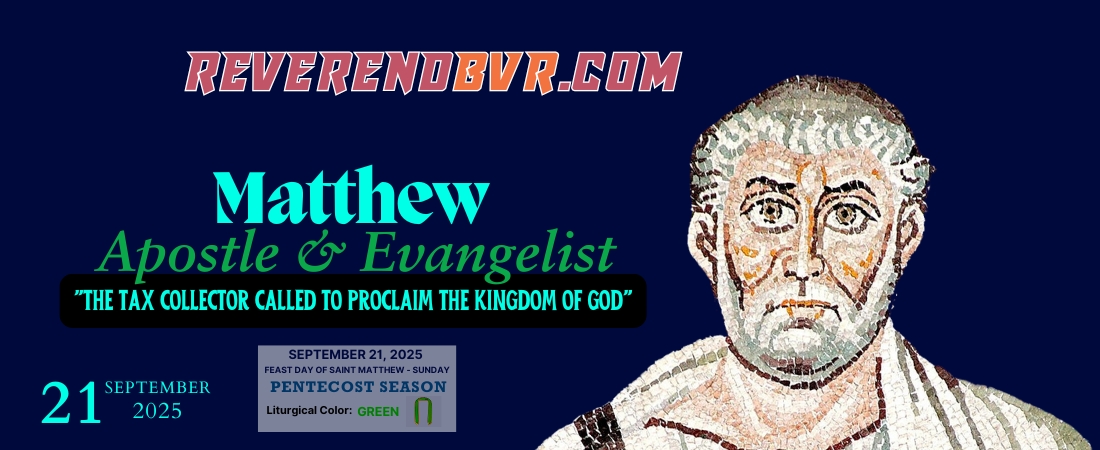The life and witness of Matthew, once a despised tax collector, exemplify the transformative power of divine wisdom, calling us to embrace faith that transcends worldly gain. Through his Gospel, Matthew reveals Jesus as the fulfillment of Old Testament promise and the true King of the Kingdom of Heaven, inviting us to a life of faithful proclamation, repentance, and hope amid adversity.
Sermon Topic: The Call to Gospel Wisdom through the Life and Witness of Matthew, Apostle and Evangelist
Textual Foundations: Proverbs 3:13–17; Isaiah 33:13–17; Psalm 18:1–6, 20–30; 2 Corinthians 4:1–6.
Website: www.reverendbvr.com
I. Introduction: The Evangelist of Divine Wisdom
“Blessed are those who find wisdom” (Proverbs 3:13). Among the Apostles who transmitted the wisdom of Christ to the world, Matthew, also known as Levi (Λευΐς, Leuis, in Greek), holds a distinctive place. Formerly a tax collector—a profession despised by first-century Jewish society—he was summoned by Christ into discipleship and transformed into an evangelist, apostle, and teacher of divine truth. His life embodies the movement from worldly gain to heavenly wisdom (cf. Prov. 3:14–15), and from isolation in society to intimate fellowship with the Lord and His Church.
Matthew’s Gospel, the first in the canonical order, becomes the gateway to the New Testament. It bridges the promises of the Old Testament with their fulfillment in Jesus the Messiah (Messias in Latin, מָשִׁיחַ Mashiach in Hebrew). His Gospel is structured with remarkable symmetry and theological intentionality, emphasizing the kingdom of heaven, Jesus as the New Moses, and the fulfillment of prophecy.
Matthew’s life was one of darkness transformed by the light of Christ. As we explore his apostolic calling and theological contributions, we engage with not only history and Scripture, but also with a living challenge to our own identity, vocation, and moral transformation.
II. Historical and Biblical Identity of Matthew
Matthew’s identity as both a historical figure and theological witness is evident from multiple sources:
- Name and Background: Matthew (Hebrew מַתִּתְיָהוּ Mattithyahu, meaning “Gift of Yahweh”) was also known as Levi, son of Alphaeus (Mark 2:14). As a tax collector (τελώνης, telōnēs), he worked under Roman authority and was considered ritually unclean and socially traitorous by Jewish contemporaries (cf. Luke 5:27–32).
- Call to Discipleship: In Matthew 9:9, Jesus sees Matthew sitting at the tax booth and says, “Follow me.” He rose and followed. This seemingly simple act reflects profound repentance and transformation—paradigmatic of Christian conversion.
- Author of the Gospel: Although the Gospel does not name its author, the early Church universally attributed it to Matthew. Papias (c. 60–130 AD) wrote, “Matthew compiled the sayings of Jesus in the Hebrew dialect” (Eusebius, Ecclesiastical History, 3.39). Scholars suggest that this likely referred to an Aramaic source or style underlying the Gospel, which was later composed in Greek with a Jewish audience in mind.
III. The Gospel According to Matthew: Theological Themes
- Fulfillment of Prophecy : Matthew’s Gospel emphasizes the fulfillment motif (πληρόω plēroō) more than any other evangelist (cf. Matt. 1:22–23; 2:5–6; 2:17–18). He presents Jesus as the Messiah whose life embodies and completes the Hebrew Scriptures.
- Jesus, the New Moses : The five major teaching blocks (chs. 5–7; 10; 13; 18; 23–25) mirror the Pentateuch, positioning Jesus as the authoritative interpreter of the Law. The Sermon on the Mount (Matt. 5–7) is not a rejection of the Law but a deepening (cf. Matt. 5:17–20).
- The Kingdom of Heaven : Uniquely, Matthew prefers the phrase “Kingdom of Heaven” (Βασιλεία τῶν οὐρανῶν) over “Kingdom of God,” likely reflecting Jewish reverence for the divine name. The Gospel proclaims an upside-down kingdom marked by humility, mercy, and righteousness (cf. Matt. 5:3–12).
- Ecclesiology and Mission : Matthew gives the clearest account of the Church among the Gospels (cf. Matt. 16:18–19; 18:15–20). His commission (Matt. 28:18–20) envisions a global mission: “Go and make disciples of all nations” (πάντα τὰ ἔθνη).
IV. Matthew’s Missionary Work and Martyrdom
Missionary Journeys and Geographic Influence of Matthews Preaching:
- Ethiopia: According to early Church traditions (e.g., Rufinus and Isidore of Seville), Matthew preached the Gospel in Ethiopia. A Coptic tradition claims he ordained bishops and planted churches there.
- Parthia, Persia, and Macedonia: Other traditions hold that Matthew went eastward toward Parthia (in present-day Iran) and possibly as far as Syria or Macedonia.
- Hebrew-Speaking Communities: Given the Semitic tone and Jewish orientation of his Gospel, some scholars argue Matthew may have ministered extensively among Hebrew-speaking Jewish Christians, possibly in Judea or Syria (e.g., Antioch).
Death and Martyrdom: He died as a martyr:
- Beheading or Stabbing: Foxe’s Book of Martyrs and other sources report he was slain in Ethiopia, possibly by sword or spear, while celebrating the Eucharist.
- Feast Day: The Western Church commemorates him on September 21, which is today.
In his death, Matthew exemplified the Pauline affirmation: “We do not preach ourselves, but Christ Jesus as Lord” (2 Cor. 4:5).
V. Application: Learning from Matthew’s Life and Witness
- Conversion: God Redeems Every Past : Matthew’s transformation from a collaborator with Rome to a proclaimer of Christ reminds us that no past disqualifies a person from grace. The Gospel is not earned by righteousness but received by faith.
- Wisdom over Wealth ; As Proverbs 3:14–15 proclaims, wisdom is more valuable than silver or gold. Matthew gave up his lucrative profession for divine wisdom. His story calls modern believers to seek first the kingdom of God (Matt. 6:33).
- Faithful Proclamation in a Hostile World: As Isaiah 33 notes, the righteous dwell securely even amidst consuming fire. In an age where truth is often distorted, Matthew’s integrity mirrors Paul’s resolve in 2 Corinthians 4:2—”We do not use deception, nor do we distort the word of God.”
- Hope in the Midst of Weakness: Psalm 18 expresses deep personal deliverance: “In my distress I called to the Lord” (v.6). This hope sustained Matthew and should sustain us when we are overwhelmed, misunderstood, or under threat.
VI. Conclusion: Eyes That See the King
Isaiah’s vision ends with a promise: “Your eyes will see the king in his beauty” (Isa. 33:17). Matthew saw that King. He walked with Him. And in his Gospel, he shows Him to us. The Gospel according to Matthew is not merely a historical record—it is an invitation to see the world through the wisdom of heaven, to renounce idolatry and deception, and to walk the narrow path of life in Christ.
Bibliography
- Brown, Raymond E. An Introduction to the New Testament. Yale University Press, 1997.
- France, R.T. The Gospel of Matthew. NICNT. Eerdmans, 2007.
- Keener, Craig S. A Commentary on the Gospel of Matthew. Eerdmans, 1999.
- Nolland, John. The Gospel of Matthew. NIGTC. Eerdmans, 2005.
- Wright, N.T. Matthew for Everyone. SPCK, 2002.
- Eusebius. Ecclesiastical History, trans. Williamson, Penguin Classics, 1989.
- Foxe, John. Foxe’s Book of Martyrs, various editions.
- Isidore of Seville. De Ortu et Obitu Patrum.
Closing Prayer:
O God of wisdom and light, Who called Matthew from the tax booth to the cross of Christ, Grant us courage to leave behind all that binds us, Wisdom to seek what is eternal, And strength to proclaim the Gospel with clarity and grace. May we, like Matthew, see the King in His beauty, And follow Him all our days. Through Jesus Christ our Lord, Amen.
© 2025 ReverendBVR.com | High-Academic Sermon Series, 2025.
Content licensed under Creative Commons Attribution-NonCommercial-NoDerivatives 4.0 International (CC BY-NC-ND 4.0). You are free to share — copy and redistribute the material in any medium or format with proper attribution. No commercial use or modifications allowed without explicit permission.
For further sermons and biblical reflections, please visit 🌐 www.reverendbvr.com/sermons

